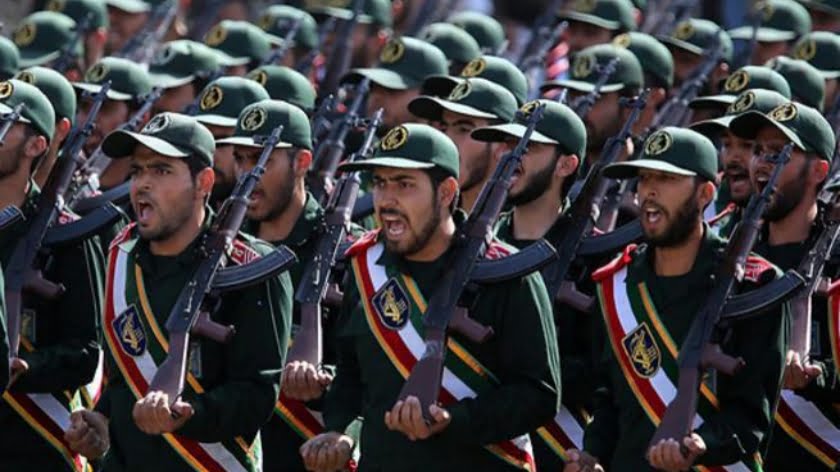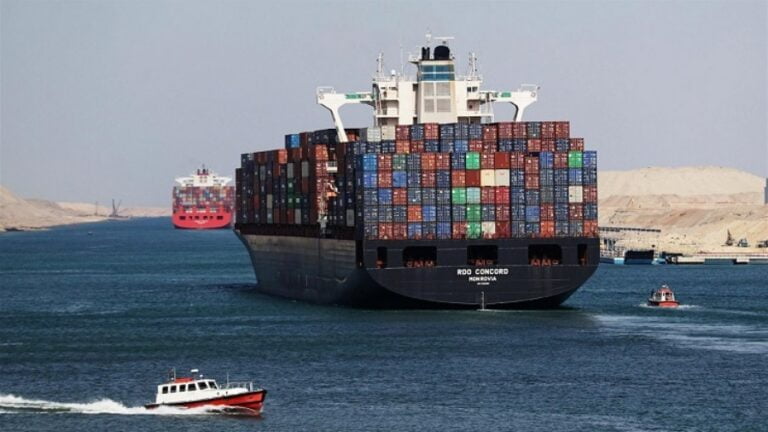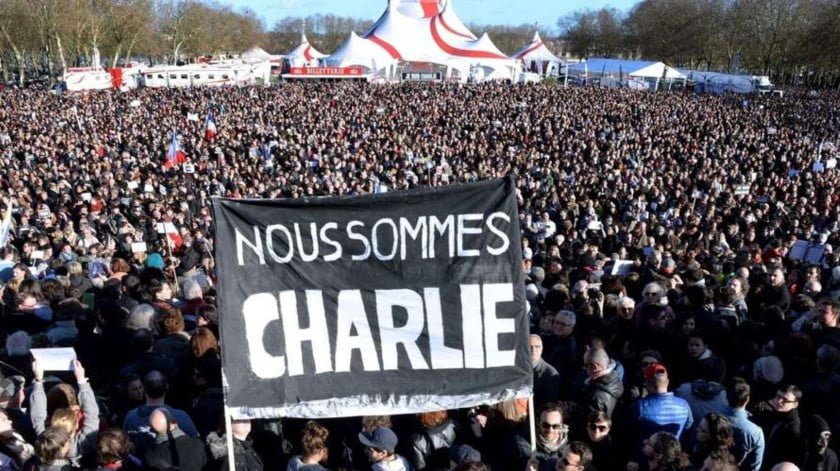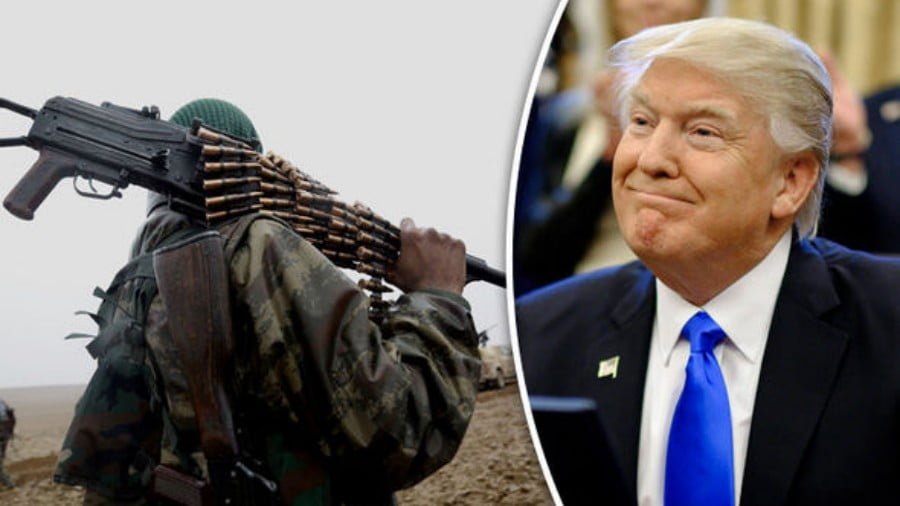The US War on the Middle East Continues
Disparate reports, perhaps unreliable, claim that Saudi Arabia attacked Iranian-backed forces bordering Syria and Iraq, on September 18th. While Israel has “been blamed” for launching similar attacks on al Bukamal and in Iraq, Israel has not officially admitted to its involvement.
Whether the reports of Saudi aggression around al Bukamal are reliable or not, the conflict map shows that the United States, Israel, and Saudi Arabia face a significant and growing challenge to maintenance of their existing hegemony over Middle East oil, gas, and resources.
Concerned about the “democratization of violence” after relatively low-tech drones successfully set two Saudi oil terminals ablaze, Washington now faces a direct threat to its authority as “policeman of the world” and will no doubt be forced to respond.
While no overt and immediate military action has been taken yet by the US and Saudi Arabia versus Iran (besides the potential proxy attacks above) political pressure exists such that some response is now mandatory. Iran has shown that it can successfully circumvent US sanctions subsequent to US duplicity in ditching the JCPOA, and Iran has formed effective alliances throughout the Middle East, thus the recent troubles for Saudi Arabia’s oil terminals only highlight the necessity to act – at least in Washington’s eyes!
But some background first. Since 2018 Washington analysts and contract strategists have been concerned about the Shia crescent* in the Middle East, and its growing cohesiveness as a strategic, tactical, and militaristic bloc. For example, Liwa Fatemiyoun fighters were crucial to defeating Saudi-backed ISIS forces in central Syria, to the great consternation of Washington in its efforts to topple Assad. Also effective – and fighting on behalf of the legitimate Syrian government – is the Liwa Zainebiyoun brigade, now a cohesive fighting force versus ISIS in Syria, thus of great concern to Washington and Saudi Arabia.
In addition to the above militias, comprising Pakistani and Afghani fighters, Iraqi fighters of the Asaib Ahl al-Haq, Kataib Hizbollah, Harakat Hizbollah al-Nujaba (Harakat al-Nujaba), and Kataib Sayyid al-Shuhada and Liwa al-Yum al-Mawud (sometimes incorrectly called the Badr Brigade overall) provide battle-hardened forces versus Saudi-backed terror groups in Syria. These Iraqi fighters are of course battle-hardened subsequent to years of resistance to the US invasion and occupation of Iraq since 2003.
In interest of brevity, the “Shia crescent” * is the logical progression of blowback since the US invasion and occupation of Iraq in 2003, and US State’s “Arab Spring” of 2011 – or more correctly, nightmare. The Arab Spring of 2011 includes the US destabilization of Libya, Syria, and Yemen. We can include many failed US policies in the mix too since then, including US treachery with regard to its abandonment of the JCPOA agreement with Iran, its duplicitous behavior regarding the Israeli-Palestinian “peace plan”, and its failed war in Afghanistan.
Likewise, the Saudi oil fires have cause great embarrassment to the Kingdom, based on its inability to thwart an attack from relatively low-tech drone weapons. Taken together, the recent attack on Saudi oil infrastructure – from wherever that attack may have originated – has provided an incendiary spark to Washington’s smoldering Neocon/Neoliberal fuse.
While Neocons and Neoliberals have received many perks from the Trump regime, the constant Neocon push for war and more war has been resisted, and Neoconservatives have lacked purpose and direction, as observed in Whither Next Neocons.
Now, with pressure to act re the Saudi oil fires, political pressure from Saudi Arabia and the media, from Israel, and from Wall Street, it appears that Neocons have their “next” to push Trump to indulge in some form of retaliation versus Iran, whether that retaliation is justified or not.
What options vs Iran does the US have?
Donald Trump has already announced new sanctions on Iran, but with strict primary and secondary sanctions already in effect, it is difficult to imagine how any new US sanctions versus Iran may truly have an impact. So, let’s assume the logical US Neonservative/Neoliberal response to the Saudi fires is to launch a strike.
Strike on Iranian oil infrastructure
Washington might consider an attack on an Iranian oil terminal as a reasonable tit-for-tat reprisal, since such a strike might not result in casualties – just as the Saudi oil fires had no casualties – and a US oil terminal strike might not arouse Iran’s allies to retaliate too, quite so much as a direct military attack would.
However, a US strike on an Iranian oil terminal would certainly result in an immediate military response from Iran, most likely to close the Strait of Hormuz with great impact to the global economy. Such a risk could include panic in the world markets, and the impetus needed to finally burst the western share market and currency bubble that has existed for many years now.
A related suggestion is to strike an Iranian gas or oil pipeline, of which many exist in the country. One option for Washington is the Abadan-Ahvaz-Arak-Tehran oil pipeline, which carries crude oil products. Another possibility is to bomb the Kazi Magomed–Astara–Abadan gas pipeline in Iran, but the impact to Azerbaijan may rule that out. A US attack on an Iranian pipeline may seem attractive to the hawks in Washington, if such a strike is perceived to cause only a limited war.
But with those attendant risks, a US attack on Iranian ground infrastructure is unlikely, therefore the US may renew its push to seize Iranian shipping and vessels, or contractors, carrying Iranian oil.
US Interdiction of Iranian Oil Assets
The US has already tried oil interdiction tactics, failing to seize the Adrian Darya (Grace-1) or bribe the Captain to turn over the ship; its location here is now quite doubtful. Iran has become expert at cloaking and accomplishing its oil exports regardless of US sanctions. So, for the US to attempt any such interdiction of Iran’s oil shipments would be foolhardy, outrageously provocative, expensive, and ultimately non-productive. In opposition to that idea, Iran has already promised that any attack by the United States or its allies within Iran will lead to war, where again, the Strait of Hormuz will be closed.
And any blockade of Iran is unlikely to be effective. Iran has control of the Strait of Hormuz. Furthermore, Afghanistan, Turkmenistan, Pakistan, and Iraq certainly will not close their borders to Iran – or allow the US to do so. The United Arab Emirates, a staunch US ally, would suffer greatly from any blockade that closes the Strait too.
US Strike on a military or nuclear target
The location of Iran’s missile installations is best known to the US Pentagon, while the Nantanz nuclear facility is known to just about everyone, subsequent to Israel’s Stuxnet attack on the facility. A US bombing of Nantanz would certainly result in many deaths, and the radioactive fall-out from such an attack would amount to unconscionable collateral damage. That leaves a limited US attack on an Iranian military facility more likely, and if minimal casualties are desired, a missile launch facility – or multiples of them – could be considered.
A US attack on Iranian missile sites would expose US warplanes to grave danger however, and should any US warplanes be lost or destroyed, a rapid and serious escalation in Iran’s defense versus US belligerents would be immediate, again with a closing of the Strait.
Drone attack on Iran’s Leadership or symbolic target
A limited drone attack on some symbolic target within Iran is another consideration, however the choice of target will be difficult and only provide a severely diminished return. Washington could attempt to assassinate an Iranian politician, leader, or military head, however the global outrage caused by that act could have serious consequences for Washington.
Further US-Saudi aggression in Syria, Yemen, or Libya?
One US response to the Saudi oil fires could be renewed US/Saudi provocation in Syria, Yemen, and perhaps even Libya, as the US attempts to re-assert whatever is left of the US-Saudi-Israeli hegemonic.
By escalating the wars in Syria, Yemen, and Libya, the United States could provide cover for ongoing losses to the Saudi oil industry and further destabilize the region, without provoking a direct shooting war with Iran. By this means, the US could leverage divisions in the Arab world to continuing US-Israeli advantage and re-assert the Global Hegemon as the Saudi fires fade in the background. Indeed, we have already seen something of this with the September 19ths Saudi-Israeli attacks on al Bukamal in Syria near Iraq.
However, the Russian Federation is committed to stabilizing Syria (subsequent to US State’s inspired insurgency there since 2011) where US forces could conflict with Russian forces, and lead to an all-out escalation of conflict. Such an escalation would raise the profile of the wars in Syria, Yemen, and Libya too — something Washington desperately hopes to keep furthest from the average American’s mind.
It is easy to forget that the Saudi oil fires were indeed the work of Ansarullah forces in defense of their land, and Washington wishes to avoid highlighting the Yemen disaster that US arms contractors have so profited from.
A Coalition of the Unwilling
Saudi Arabia has few friends in the Middle East. Even the United Arab Emirates has distanced itself from Saudi, as the military situation in Libya and Syria has degraded and gone badly for Saudi’s terrorist proxies.
For example, Turkey will not join in any coalition to attack Iran. Turkey has defacto withdrawn from NATO, by its purchase of S-400 missiles and interest in purchasing Russian-made jets. Those purchases and collaboration with Russia guarantee a virtual departure from NATO, even though Turkey has not publicly announced it.
Furthermore, while Turkey’s military bases host US aircraft and operations, Turkey is actively cooperating with Russia and has agreed to partner with Russia on defense projects in Syria. Since Turkey and Russia are cooperating in Syria, no doubt Turkey will cooperate with Iran, too. Indeed, Turkey has publicly stated that it will not allow its bases to be used in any attack on Iran, by the US.
Iraq too will not join any coalition versus Iran. Iraq has demanded for years now that the US cease its occupation of Iraq and remove its forces, and Iraq has likewise stated that it will not allow its territory to be used as a base for attacking Iran.
The potential for Iraqi involvement in local action versus the US in the event of war with Iran is seldom mentioned by the western press, but must be a very real concern for Pentagon war gamers.
The United Arab Emirates – traditionally an aggressive US ally in the region – is only too aware of these shifting geopolitical sands, and has recently backed off from its longstanding confrontation with Iran. According to sources, the UAE has reconsidered its support for the US after losing key US corporate contracts to others in the region. Also, the UAE achieved nothing subsequent to its expensive military intervention in Libya and Yemen, and did not receive support from the US there.
The UAE has concerns about the vulnerability of its own economy in the event of a US war with Iran, and had second thoughts too when American treachery resulted in the US unilateral withdrawal from the JCPOA agreement with Iran. In brief, there is no support in the United Arab Emirates for a US war with Iran.
Russia and China have publicly and privately urged the United States to stand down from US threats versus Iran, and neither country would of course participate in any coalition versus Iran. Even the Solomon Islands has reconsidered its deference to the US, where Manasseh Sogavare has cut ties to Taiwan and recognized China’s claim to the island chain; so presumably the Marshall Islands, Micronesia, Palau – and Solomon Islands – will not participate in such a coalition either!
In fact, the US is having such difficulty mustering any support for its proposed attack on Iran (besides the usual suspects such as England and perhaps Poland) that is the reason, in part, for the US delay in taking action. In conclusion, we must hope that cooler heads prevail, and that no attack on Iran by the US or Saudi will occur, and that the many wars engaged in and backed by the United States, Saudi Arabia, and Israel will be opposed by a public push for peace instead.
*Shia crescent is a notional term favored by Washington and the major media for categorization and division
By Steve Brown
Source: The Duran







